Statistics show that mobile devices contribute to over 58% of global web traffic, a figure that highlights the necessity for adaptable and efficient websites. In a bustling metropolis like London, where businesses compete on a global stage, the ability to deliver seamless digital experiences across all devices is paramount. By adopting the strategies of responsive website design london businesses, companies can enhance user engagement, improve accessibility, and secure a competitive edge in the ever-evolving digital landscape.
Why Responsive Design Matters in the Modern Era
Adapting to the Mobile-First World
The increasing reliance on smartphones has redefined how users interact with websites. Studies indicate that over 58% of global web traffic now comes from mobile devices. A website that isn’t optimized for mobile users risks alienating a significant portion of its audience. Responsive designs address this by ensuring websites look and function beautifully, whether viewed on a desktop, tablet, or smartphone.
Enhancing User Experience (UX)
User experience is at the heart of successful web design. A responsive site adapts to the user’s screen size, making navigation intuitive and content easy to consume. For example, a mobile-responsive site minimizes the need for excessive zooming or horizontal scrolling, creating a frictionless browsing experience. This improved UX can reduce bounce rates and increase dwell time—key metrics for online success.
Boosting SEO Rankings
Search engines like Google prioritize mobile-friendly websites in their rankings. A responsive design not only enhances usability but also aligns with Google’s mobile-first indexing policy. By adopting responsive web design, businesses can improve their search engine rankings, making their sites more discoverable to potential customers.
The Core Features of a Responsive Website
Fluid Grid Layouts
Responsive designs use fluid grids, where elements are sized proportionally rather than in fixed units like pixels. This ensures that content scales appropriately across different devices, maintaining visual consistency.
Flexible Images
Images are a critical part of web design, but they can become a liability if not optimized. Responsive websites use flexible images that adjust automatically to the viewer’s screen size, ensuring faster load times and an optimal display.
Media Queries
Media queries are a cornerstone of responsive design. They enable developers to apply different styles based on the device’s screen dimensions. This ensures that content remains visually appealing and accessible, regardless of the viewing platform.
Benefits of Responsive Websites for Businesses in London
Increased Reach
London is a global hub for commerce, attracting a diverse audience. A responsive website ensures businesses can connect with this varied demographic, regardless of the devices they use.
Cost-Effectiveness
Maintaining separate desktop and mobile versions of a website is both costly and time-consuming. A single responsive design eliminates this duplication, saving resources while ensuring a cohesive brand experience.
Future-Proofing Your Business
Technology evolves rapidly, and new devices with varying screen sizes continue to enter the market. Responsive designs future-proof websites, ensuring they remain functional and visually appealing across emerging technologies.
How Responsive Design Impacts Key Industries
E-commerce
For online retailers, a responsive website is crucial for driving sales. Mobile users account for a significant portion of online shopping, with mobile commerce expected to make up 72.9% of e-commerce sales by 2025. A responsive design ensures a smooth shopping experience, from browsing to checkout.
Hospitality
The hospitality industry thrives on first impressions. Potential guests often explore hotels or restaurants via their mobile devices. A responsive website helps these businesses showcase their offerings effectively, increasing booking rates.
Recruitment
Recruitment agencies rely heavily on their websites to attract candidates and clients. Responsive designs ensure that job listings and application forms are accessible on any device, enhancing engagement and conversions.
Best Practices for Responsive Website Design
Prioritize Speed
Slow-loading websites are a major turn-off for users. In fact, a delay of just one second can reduce mobile conversions by up to 20%. Optimizing images, leveraging browser caching, and minimizing code can enhance site speed.
Focus on Navigation
Intuitive navigation is essential for a positive user experience. Ensure menus and buttons are easy to access and operate, even on smaller screens.
Test Across Devices
Before launching a responsive website, test it on multiple devices and browsers to identify and resolve potential issues. Tools like Google’s Mobile-Friendly Test can provide valuable insights.
Choosing the Right Partner for Responsive Design
Creating a responsive website requires expertise and a deep understanding of user behavior. Businesses looking to make a mark in London’s competitive landscape should collaborate with seasoned professionals who prioritize quality and innovation.
Reecroot: Your Go-To Solution for Responsive Website Design
Reecroot, based in the heart of London, specializes in crafting bespoke, responsive websites tailored to individual business needs. With a focus on recruitment agencies, Reecroot delivers designs that are visually stunning, highly functional, and optimized for user engagement. Their expertise ensures that your website not only meets but exceeds industry standards.
Investing in responsive website design london is a step toward digital excellence. Reach out to Reecroot today to transform your online presence and achieve measurable results.











